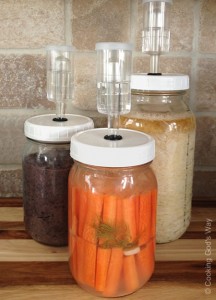 Many websites report lacto-fermenting as the holy grail of health, today we will examine some of these reports helping you to understand the fact or fiction shared. Stories are written about how eating lacto-fermented foods has helped heal many health issues, from gut digestive issues to life long health issues like fibromyalgia. How much and how often do we have to eat these foods to see benefits? What we just really want to know is, are these foods just old fashioned wives tales or something we want in our diet?
Many websites report lacto-fermenting as the holy grail of health, today we will examine some of these reports helping you to understand the fact or fiction shared. Stories are written about how eating lacto-fermented foods has helped heal many health issues, from gut digestive issues to life long health issues like fibromyalgia. How much and how often do we have to eat these foods to see benefits? What we just really want to know is, are these foods just old fashioned wives tales or something we want in our diet?
How can I make any judgements? In college one of my areas of study was research science and I was trained as a research scientist. I am also certified in nutritional consulting. What I intend to do in this article is look at some of the claims about lacto-fermentation and add a clear, balancing judgement from a science outlook (with some common sense).
What Are Lacto-fermented or Fermented Foods?
Lacto-fermented and fermented foods are foods that are fermented in an anaerobic process, (without oxygen), by lactobacilli microorganisms. Lactobacilli derive their name from the fact that they are lactic acid producing. The lactobacilli consume carbohydrates (sugars) in foods and produce lactic acid in a process called lactic acid fermentation, or more commonly called lacto-fermented / fermented foods.
Research has shown that these types of lacto-fermented foods, (sauerkraut) have been produced since the building of the great wall of China. Different regions and countries adopted their own recipes to suit their culture. These foods were fermented to preserve the foods between growing seasons. No special cultures were used to carry out the operation since lactobacilli are naturally present on the surface of vegetables.
Types Of Fermented Foods
There are two main types of fermented foods, dairy and vegetable.
Dairy Fermented Foods
I am sure you are very familiar with fermented dairy products and these can be easily purchased or made at home, such as yogurt, cheese, and kefir milk. Lactic acid bacteria, (LAB), are responsible for consuming the lactose, the main sugar in milk, and producing the fermented products. These dairy products contain the common LAB, Lactobacillus, Streptococcus, Leuonostoc, Enterococcus, and Lactococcus.
After milk is fermented many beneficial compounds are found as a result of the LAB activity, such as B-12, folic acid, biotin and conjugated linoleic acid, (CLA). Bioactive peptides are also released by the activity of the LAB in fermented milk products and have been reported to have anti-hypertensive, anti-microbial, and antioxidant properties in the human body.
 Claim #1 – Yogurt is good for your digestive tract.
Claim #1 – Yogurt is good for your digestive tract.
It has been shown in research that galacto-oligosaccharide, which is produced by LAB during the fermenting process has a prebiotic effect on intestinal micro-bacteria. This effect is that they promote the growth of benefical bacteria in the digestive tract. Yogurt is rich in minerals, including calcium, potassium, phosphorus, and zinc. These mineral are highly bio-available as a result of the fermentation process, allowing the body to easily digest and absorb them. Protein in the milk is pre-digested during the process of fermentation making its absorption much easier for the body.
In the Netherlands, Sweden, and Denmark combined studies have found that fermented milk products can significantly decrease disease states, such as bladder cancer, cardiovascular disease, and periodontitis.
Result #1 The Truth – Yogurt is good for the digestive tract.
Based on the studies mentioned above yogurt helps to grow healthful bacteria in the digestive tract. It is also a rich source of certain minerals and the protein is much easier for the body to digest. Sounds like a win-win. For the best benefit be sure to get a yogurt that contains “live” cultures. Homemade yogurt is the best yogurt you can get since you will make it with great ingredients and no preservatives or chemicals.
Do Probiotics Live Through The Digestive Tract?
Lets take a pause for a minute and take a look at a claim that some medical professionals and blog writers bring up when talking about probiotics from foods that are lacto-fermented and fermented.
Claim #2 – Probiotics contained in yogurt do not survive the digestive tract.
Your digestive tract is a harsh environment with tough enzymes and digestive agents needed to break down harder to digest proteins and fats. These healthful bacteria have to survive the mouth, but the real test starts when they reach the stomach’s extremely acidic environment. If these friendly bacteria make it past the stomach they enter the small intestine where they are exposed to bile and more digestive enzymes. It has been found through research that some bacterial strains can survive and grow in the small intestine as they continue their path to the colon.
To answer the question if commercial yogurts bacteria can survive the digestive tract, a study was done that looked at the effect on the fecal bacterial count of probiotic LAB found in yogurt. Basically the study feed a part of the group yogurt with a live probiotic count for 20 days, while the rest of the group was given yogurt without live probiotics. It was found that when the fecal bacteria was examined the group that consumed live probiotic yogurt had a much higher number of live Lactobacillus strains. The study proved that live probiotics do survive the digestive tract.
Result #2 The Truth – Probiotics contained in yogurt does survive the digestive tract.
There have been many different studies done to confirm that probiotic strains survive the digestive tract and the results have been similar. If the yogurt contained live probiotics they tended to be found in high counts in the fecal matter of study members. If you are looking for live culture yogurts, look for the words “contains live cultures“. Many yogurts say “made with live cultures”, but this statement could mean they are not alive anymore in the product you buy.
The Original Veggie Fermenter (starter kit).
Just add the food and a jar
Fermented Vegetables
 Most vegetables can be fermented, and this is usually done to enhance the nutritional quality and shelf life of the vegetables. The most popular vegetables to lacto-ferment are:
Most vegetables can be fermented, and this is usually done to enhance the nutritional quality and shelf life of the vegetables. The most popular vegetables to lacto-ferment are:
- Cabbage – (sauerkraut, kimchi)
- Cucumbers – (pickles)
- Carrots – (carrot sticks)
Claim #3 – Probiotic levels in fermented vegetables are more beneficial to the body than commercial probiotic pills.
A study was performed which evaluated the properties of lactic acid bacteria (LAB) from kimchi, a fermented Korean cabbage food. It was shown that all strains of LAB found in kimchi were able to survive the digestive tract and had the ability to adhere to the intestinal tract better than Lactobacillus rhamnosus GG, a commercial probiotic strain used worldwide. It was also found that these strains displayed anti-microbial ability against food-borne pathogens. This same study showed that the LAB found in kimchi was able to lower cholesterol.
Result #3 The Truth – Probiotic levels in fermented vegetables are more beneficial to the body than commercial probiotic pills.
LAB from fermented vegetables survive the digestive tract just as they did in the LAB rich yogurt. While not many Americans eat kimchi, sauerkraut which is more accepted displays the same type of LAB as kimchi. Keep in mind to receive the benefits of these lacto-fermented foods they must be raw and unpasteurized. While there are sum raw versions of sauerkraut available in commercial form it is best to make it yourself, Best Ever Lacto-fermented Sauerkraut.
What Amount Of Lacto-fermented Foods To Eat?
Claim #4 – You have to eat the majority of meals as lacto-fermented / fermented foods to receive benefits.
It has been shown in studies that the amount of lacto-fermented / fermented foods needs to contain a dosage of 108–109 CFUs (colony-forming units) a serving to receive a benefit to the digestive tract. In other words this is about one hundred million to one billion per serving, which in real world speak is less than a teaspoon of yogurt, which was shown in a 2013 study.
Lacto-fermented / fermented foods when analyzed for their lactobacillus count in a lab come back in the average of ten trillion bacteria in a 4-6 ounce serving. If you compare this to a probiotic capsule this 4-6 ounce serving delivered as much as 2 bottles of 100 count probiotics.
Result #4 The Truth – You do not have to eat the majority of meals as fermented foods to receive benefits.
Eating just 2-4 ounces of lacto-fermented foods delivers as much a one bottle of probiotics. It appears that if a person ate a serving of homemade yogurt and a serving of lacto-fermented vegetables daily that their digestive tract could be positively influenced.
Doctor Natasha Campbell-McBride, MD, neurologist sums it up best in her quote, “With every mouthful of sauerkraut you’re consuming billions of beneficial microbes which will be killing the pathogens in your gut, driving them out, and replenishing the beneficial flora in your digestive tract.”
Make Fermented Food At Home – Easily
Many Additional Benefits Of Lacto-fermented Foods
Reduce Heart Attack Issues – Studies show that increasing levels of probiotics in the body helps lower the chance of heart attack. Eat up.
Lowers Cholesterol – Lacto-fermented foods help block cholesterol production and help the body remove excess cholesterol. Wow a win on both ends for people with cholesterol concerns.
Lose Weight – Lacto-fermented foods are nutrient dense. You will eat less and feel full faster! Remember we eat for nutrition.
Protects The Body From Stress – Lacto-fermented foods help the digestive tract to protect itself when stress happens in your life.
Balances Blood Sugar Levels – Lacto-fermented foods, like sourdough breads, reduce the load on the pancreas allowing insulin levels to stay lower, keeping blood sugar spikes at bay. Just be sure it is REAL Sourdough not just flavored.
Builds Immune System – These great foods supply lactobacilli and bifidobacteria to the gut in great supply. This can help to increase the number of these necessary bacteria in the intestines and can also help to prevent colonization of pathogenic organisms.
Aides Detoxification – During the making of these lacto-fermented vegetables any toxins that they were sprayed with when grown are broken down. Add to this that these foods are nutrient dense and you start to understand they give the body the basic components needed for detoxification.
Vitamins Are Boosted – Sauerkraut has more vitamin C than orange juice. During the fermenting process foods vitamin levels are increased, some foods more than 20 times their raw levels.
Minerals Are Made Available – Most grains and many vegetables have the minerals trapped in the tough cellular wall of the organism. Lacto-fermenting breaks down these tough membranes so proper assimilation can easily happen.
Helps Digest Cooked Foods – Lacto-fermented foods have enzyme levels increased for better nutrition, but pack another very nice feature. They attract digestive juices like a magnet, which increases the digestion of the cooked foods we eat! Cooked foods normally repel digestive juices… so all you have to do is eat lacto-fermented foods with your cooked foods. Now that bratwurst looks… and tastes good with sauerkraut on it, and it makes sense!
The claims I picked to examine were ones that I have seen on many websites about health, and they are topics that form the foundation of lacto-fermented / fermented foods. I hope that you now see the science behind lacto-fermented foods and understand the truths. These great foods are easy to make at home to get the highest benefits. And keep in mind that you just need to eat these foods on a regular basis.


Speak Your Mind